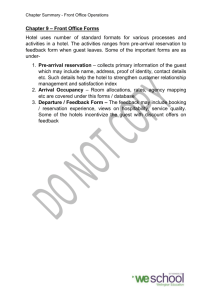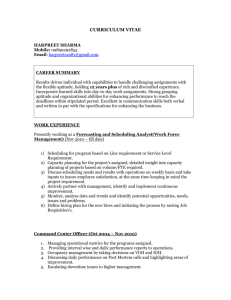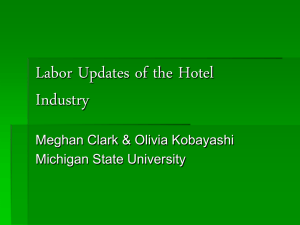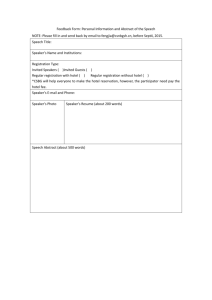Diploma in Hotel Management
advertisement
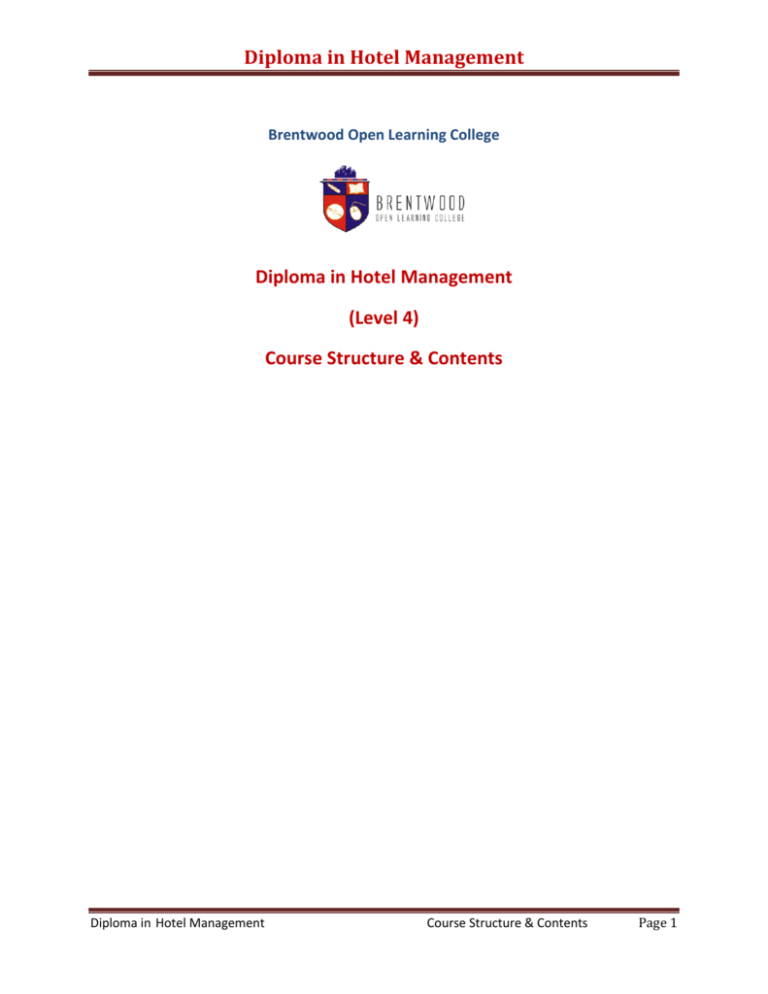
Diploma in Hotel Management Brentwood Open Learning College Diploma in Hotel Management (Level 4) Course Structure & Contents Diploma in Hotel Management Course Structure & Contents Page 1 Diploma in Hotel Management Unit 1 Introduction Hotel Management The unit 1 covers the following topics: What is Hospitality Management What is Hospitality? Brief History of Hospitality Management (History of Hospitality Management in Europe) Hotel Industry Overview Types of Lodging Facilities (Hotels, Motels, All – Suites, Limited Services Hotels, Extended-Stay Hotels) Market Orientation Sales Indicators (Occupancy, Average Daily Rate, Yield Percentage) Levels of Service(Chain Affiliation, Referral Property, Company- Owned Property, Management Contract Property, Brands, Independent Properties) Organizational Structure of Hotels (Department Managers, General Manager, Assistant General Manager, Food and Beverage Director, Physical Plant Engineer, Executive Housekeeper, Human Resources Manager, Marketing and Sales Director, Front Officer Manager, Controller, Director of Security, Parking Garage Manager) Overview of Hotel Management (Planning, Developing Objectives for a Hotel, Goals, Single Use Plans, A Hierarchy of Plans and Sub Plans, Standing Plans, Long or Short Term Planning, Policy) Unit 2 Managing Front Office Operations The unit 2 covers the following topics: Front Office Functions Front-of-the-House Operations Back-of-the-House Operations Front Office: Organizational Structure The Art of Supervising The Reservation Office Diploma in Hotel Management Course Structure & Contents Page 2 Diploma in Hotel Management Type of Reservation System Accepting or Denying Reservation Yield Management: Choosing the Most Profitable Reservations (Basic Concepts of Yield Management, Rate Category Controls, Length-of-Stay Controls, Generating Reservation Report, Managing Reservations, Check-in Process, Front Office Accounting, Check-Out Process, The Electronic Front Office (EFO), Unit 3 Housekeeping, Engineering & Security The unit 3 covers the following topics: Housekeeping Organization of Housekeeping Department Functions of The Housekeeping Department Management of Guest Amenities Managerial Styles Engineering Security (Importance of a Security Department, Organization of a Security Department, In-House Security Department versus Contracted) Developing the Emergency Communication Plan. (Responsibilities of the Front office, Employee Safety Programs) Unit 4 Recruitment and Selection The unit 4 covers the following topics: Flexible Employees The Importance of planning ahead Describing the Job to be done The Job description Description the ideal recruit Attracting Candidates Advertising Diploma in Hotel Management Course Structure & Contents Page 3 Diploma in Hotel Management Getting information from the candidates Short Listing the candidates Selection(One-to-one interview, Two or more interviewers, More than one interview Role Play, Personality/ Aptitude Test, References, Selection interviews, Prior to the interview, During the interview, After the interview, New employee induction programmes, On the first day of work) Unit 5 Training and Development The unit 5 covers the following topics: The Benefits of Training Identifying Training Needs The Training Plan Carry Out the Training Programme Evaluating The Training Undertaken Developing a Training Programme (Identification of Tasks and Job Management Skills, Preparing Step-by-Step Procedures, Management Concepts, Steps in the Training Process, Preparation, Delivery, Method of Presentation, Skill Demonstration, On-theJob Training, Role- Playing, Commercial Videos, Distance Learning, Trial and Error, Follow-up) Administering a Training Programme (Cross-training, Developing a Trainer) Unit 6 Quality Management The unit 6 covers the following topics: Hospitality Retail Service Quality (The Five Dimensions of Service) Quality Management and Hospitality Retail Operations Inspections and Quality Assurance (Quality Advisor’s Visit, Statutory Obligations, The Food Safety Acts, Grading bands and conditions) Quality standard awards in hospitality operations ISO 9000 Series (Investors in People, Total quality unit management) Quality advisor’s sample assessment sheet Diploma in Hotel Management Course Structure & Contents Page 4 Diploma in Hotel Management Unit 7 Marketing and Advertising The unit 7 covers the following topics: Introduction The Hotel Market (Primary and Secondary Levels of Demand, Potential Buyers for Accommodation and Catering Services) The Hotel Product (Hospitality Product Augmentation) Hotel Pricing and Distribution (Pricing, Distribution, Communications, Determining and Creating Specific Advertising Message) Extended Marketing Mix for Hotels Marketing Consortium or Cooperatives. Unit 8 Managing Food and Beverage Operations The unit 8 covers the following topics: Introduction Food and Beverage Operations Assessment of Market and Consumer Needs Food Service Operation System Designing the Restaurant ( Equipments) Menu Planning Managing Food Service Operations Beverages (Beverage Control) Cost Control Computer Applications in Food and Beverage Services (Selecting a Computer System, Computer Uses) Unit 9 Managing Interdepartmental Communications The unit 9 covers the following topics: Marketing and Sales Department Housekeeping Department Diploma in Hotel Management Course Structure & Contents Page 5 Diploma in Hotel Management Food and Beverage Department Banquet Department (Controller) Maintenance or Engineering Department ( Security Department, Human Resources Management Department, The Role of Total Quality Management in Effective Communication, An Example of Total Quality Management in a Hotel) Unit 10 Accounting in Hospitality The unit 10 covers the following topics: What is an Account ? Types of Accounts At The Front Desk (Guest Accounts, Non- Guest Accounts, Voucher, Types of voucher) Basic Principles of Accounting (Important Point about Folio) Type of Folios used in Hotels (Ledgers Used at the Front Desk) Accounts Which are Included in City Ledger (Account Aging, Recording Business Transactions, The Profit and Loss Account and Balance Sheet) Fixed Assets Plus Current Assets Minus Liabilities = Capital (Income and Expenses, Capital and Revenue Expenditure, Assets and Liabilities, Capital, Working Capital, Profit and Loss Accounts, Recording Revenue, Recording Expenses, Petty Cash, Balance Sheet, Budgeting, Bank Charges, Credit Cards) Diploma in Hotel Management Course Structure & Contents Page 6


